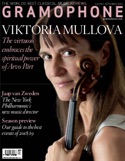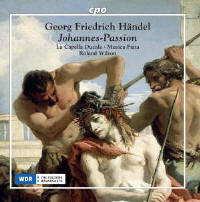Texte paru dans: / Appeared in: |
|
|
Outil de traduction (Très approximatif) |
|
|
Reviewer:
David Vickers The accomplished instrumentalists of Musica Fiata and eight singers of La Capella Ducale vividly exploit a wide range of textures: fruity oboes and bassoon are accorded prominence in several movements (eg the tenor duet ‘Welche sind des Heilands Erben?’), two interpolated chorales by Johann Crüger and the final slumber chorus are shaded eloquently, and Wilson’s attention to musical details ensures a compelling interpretation. Hans Jörg Mammel declaims the Evangelist’s narrative boldly and an assortment of short arias are sung expertly – there are notably fine contributions from Ulrike Hofbauer (‘Durch dein Gefängnis’, in dialogue with Anette Sichelschmidt’s assertive concertante violin) and Wolf Matthias Friedrich (‘Erschüttere mit Krachen’, a thunderous response to the crowd baying for Christ’s Crucifixion). Similar problems of authorship relate to the chorale cantata Ach Herr, mich armen Sünder: a manuscript copy (now lost) features a dubious attribution to ‘Hendel’ but the only sensible deduction is that it was written by a proficient musician in middle Germany in about 1700. Wilson concludes ‘The music speaks for itself; appreciate it for what it is, whoever composed it.’ Quite so – the inventive setting of six verses of the famous Lutheran hymn tune is performed superbly, replete with juicy organ continuo played on a modern copy of an instrument by Silbermann. |
|




